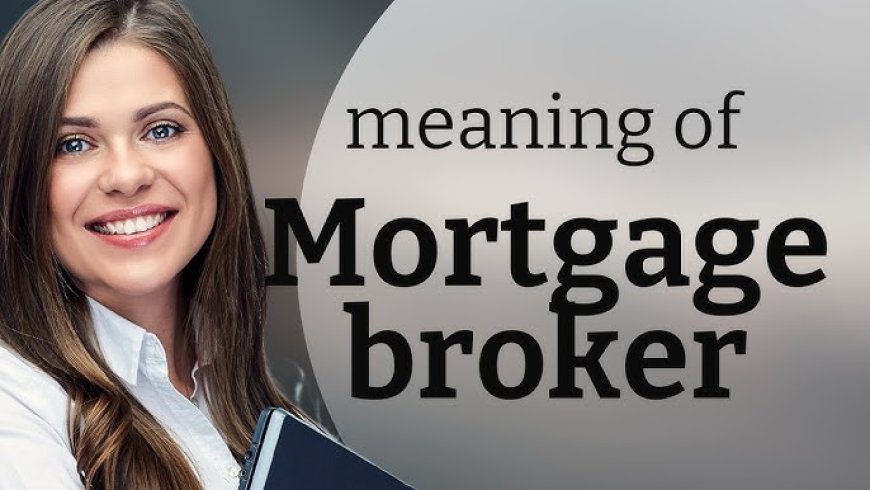Understanding Mortgage Brokers: A Complete Guide

Introduction
Buying a home is one of the most significant financial decisions most people will make in their lives. Whether you’re a first-time homebuyer or an experienced real estate investor, navigating the mortgage market can be overwhelming. This is where a mortgage broker comes in. A mortgage broker acts as a bridge between borrowers and lenders, helping clients find the best mortgage deals to suit their financial needs.
In this comprehensive blog post, we will explore the role of mortgage brokers, how they differ from loan officers, their advantages and disadvantages, and what you should know before hiring one. We’ll also include detailed tables and easy-to-follow lists to enhance your understanding.
What Is a Mortgage Broker?
A mortgage broker is a licensed financial intermediary who connects borrowers with mortgage lenders. Instead of offering loans directly, brokers assess a borrower’s financial profile and shop around for loan options from various institutions on their behalf.
Responsibilities of a Mortgage Broker
-
Evaluating the client’s financial condition
-
Shopping for competitive loan products
-
Assisting with paperwork and pre-approvals
-
Communicating with lenders and underwriters
-
Advising on rates, terms, and loan types
Mortgage Broker vs. Loan Officer
It’s common to confuse mortgage brokers with loan officers, but they serve different functions.
Mortgage Broker vs. Loan Officer
| Feature | Mortgage Broker | Loan Officer |
|---|---|---|
| Works for | Independent or brokerage firm | Specific bank or lending institution |
| Offers loans from | Multiple lenders | One financial institution |
| Goal | Find the best deal across lenders | Sell lender’s loan products |
| Paid by | Borrower and/or lender | Lender |
| Flexibility | More flexible loan options | Limited to in-house offerings |
Benefits of Using a Mortgage Broker
Using a mortgage broker can streamline your home-buying experience and potentially save you money.
Advantages of Hiring a Mortgage Broker
-
Wide Range of Loan Options
Brokers work with multiple lenders, giving you access to a variety of loan products. -
Time-Saving
They handle the legwork of comparing rates, managing paperwork, and coordinating with lenders. -
Expertise
Brokers understand lending criteria and can match you with the best-suited mortgage. -
Better Rates
Brokers often have access to exclusive deals not available to the public. -
Assistance with Poor Credit
Brokers can help clients with less-than-perfect credit find suitable lenders.
How Mortgage Brokers Are Paid
Mortgage brokers typically earn a commission that’s either paid by the borrower, the lender, or both. The fee is usually a percentage of the loan amount (e.g., 0.5% to 2.75%).
Mortgage Broker Compensation Breakdown
| Compensation Type | Description |
|---|---|
| Lender-Paid | Broker is compensated by the lender |
| Borrower-Paid | Fee paid directly by the borrower |
| Combination | Rare cases where both share cost |
| Average Commission | 1%-2% of the loan amount |
| Disclosure Requirement | Must be disclosed under federal law |
Potential Drawbacks of Using a Broker
While mortgage brokers offer many advantages, there are also risks and limitations to be aware of.
Disadvantages to Consider
-
Broker May Favor Certain Lenders
Some brokers may be incentivized to steer borrowers toward specific lenders. -
Not All Lenders Work with Brokers
Some banks and credit unions only offer mortgages directly to consumers. -
Fees Can Vary
Depending on the arrangement, borrowers may pay more in fees or closing costs. -
Limited Control Over Process
Relying on a third party means you depend on their communication and coordination.
How to Choose a Mortgage Broker
Finding the right mortgage broker can make a significant difference in the quality of your loan experience.
Key Qualities to Look for in a Broker
| Quality | What to Look For |
|---|---|
| Licensing | Check NMLS (Nationwide Mortgage Licensing System) |
| Experience | Years in the industry and track record |
| Transparency | Clear explanation of fees and process |
| Reviews/References | Positive client testimonials |
| Lender Network | Access to a wide range of mortgage lenders |
When Should You Use a Mortgage Broker?
Mortgage brokers can be especially useful in the following situations:
-
You are a first-time homebuyer unfamiliar with the process.
-
You have unique financial circumstances (e.g., self-employed, low credit).
-
You’re buying a non-traditional property not covered by standard lenders.
-
You want to compare multiple loan offers without doing all the work yourself.
-
You're looking for the best possible interest rate or terms.
Mortgage Broker Process Explained
Here’s a simplified look at the step-by-step process of working with a mortgage broker.
How the Mortgage Broker Process Works
-
Initial Consultation
The broker assesses your financial situation and loan goals. -
Loan Shopping
Broker searches the market for suitable mortgage options. -
Pre-Approval
Helps secure pre-approval letters to assist in your property search. -
Application Assistance
Broker helps complete and submit all necessary paperwork. -
Lender Liaison
Communicates with underwriters, appraisers, and lenders during processing. -
Loan Finalization
Ensures all documents are in order and closes the loan with you.
Frequently Asked Questions (FAQs)
Q: Is it more expensive to use a mortgage broker?
A: Not necessarily. While brokers earn a commission, they may also find you better rates or lower fees than you'd find on your own.
Q: Can a broker guarantee approval?
A: No broker can guarantee a loan, but they can improve your chances by matching you with the right lender.
Q: How long does the process take?
A: It typically takes 30–45 days from application to closing, depending on the lender and complexity of the deal.
Conclusion
A mortgage broker can be an invaluable partner in your home-buying or refinancing journey. With their industry knowledge, lender access, and negotiation skills, they can simplify the process and potentially save you money. However, it’s important to choose a reputable broker, understand how they’re compensated, and stay involved throughout the mortgage process.
By weighing the pros and cons and understanding the role they play, you’ll be better equipped to decide if a mortgage broker is right for your specific financial situation.





























